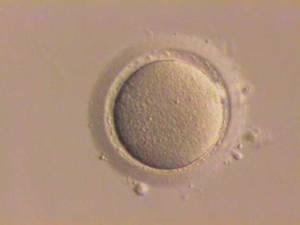It's a sad fact that a woman's egg cells don't last forever, and we eventually lose our fertility. Women are born with over a million potential egg cells, but only 500 turn into mature eggs, and they're almost all gone by the time a woman reaches her early 50s. But this happens at very different ages for different women, suggesting that there's a hefty genetic component in the mechanisms driving our biological clocks.
And now new research published in Science Translational Medicine this week  shows that the age-related decline in the quality and quantity of a woman's eggs may be linked to problems with a vital DNA repair pathway involving a couple of infamous genes - BRCA1 and BRCA2.
shows that the age-related decline in the quality and quantity of a woman's eggs may be linked to problems with a vital DNA repair pathway involving a couple of infamous genes - BRCA1 and BRCA2.
These are breast cancer genes, so what are they up to here? Well, the BRCA genes normally help cells to repair DNA damage throughout the body, and they're a potent way of helping to prevent cancer - this explains why people with faulty BRCA genes are at a greater risk of breast, ovarian and prostate cancers. But as we age, these repair mechanisms get less efficient, and damaged cells accumulate. The lead researcher of this work, Kutluk Oktay at New York Medical College, noticed that women with faulty BRCA genes coming to his fertility clinic tended to produce fewer egg cells, so he wondered if these repair mechanisms might also be at play in the way that egg cells degrade over time.
The scientists started by looking in mouse and human eggs for DNA damage - specifically the double-strand breaks that are usually repaired by the BRCA genes. They found that this kind of damage piled up in the egg cells with age, suggesting it was no longer being repaired properly. They then tested whether it was actually the BRCA genes playing a role, by knocking down the levels of the genes using a technique called RNA interference and finding that there was even more damage than usual. They also engineered mouse egg cells with extra amounts of BRCA1 and found that older eggs with an extra dose could survive DNA damage as well as eggs from younger mice.
To confirm that the findings hold up in real live women, the researchers looked the ovaries of young women with faults in their BRCA genes. They found that women with faults in BRCA1 had smaller reserves of egg cells in their ovaries, while mice with faulty BRCA1 had smaller litters than genetically normal animals. And although both humans and mice with faulty BRCA2 genes seemed to have no fertility problems, the scientists suspect that the effects of this gene may come into play later in life.
It's important to stress that the scientists haven't yet directly linked faulty BRCA genes to fertility problems, but this paper has opened up a whole new avenue of research in this area. Once the researchers have pinned down what's actually going on at a cellular level, they hope to find ways to slow down age-related loss of fertility.










Comments
Add a comment